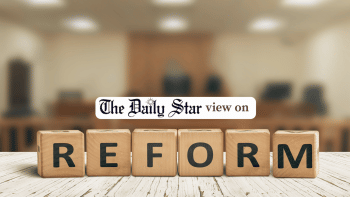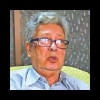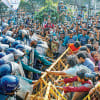'A truly democratic society must not suppress differing opinions'

Samina Luthfa, a faculty member at the Department of Sociology at Dhaka University, speaks with Monorom Polok of The Daily Star about the performance of the interim government, six months since it took office on August 8, 2024.
Six months after the interim government assumed office, do you think the country has progressed as expected?
The expectation of the July uprising was that Bangladesh would move forward, breaking free from the repression, mismanagement, corruption, and lack of freedom of speech that had persisted until then. People from all walks took to the streets, hoping for change. Students played a key role, but it was a mass movement—workers, professionals, and ordinary citizens all participated. However, despite the sacrifices, the reforms people hoped for have not been fully realised.
How do you assess the government's response in ensuring justice for the victims of violence during the uprising?
The progress of getting justice for the victims of mass killings has been slow. During the uprising, crimes against humanity were committed—people were shot at close range, fired upon from helicopters, and even killed while standing on their balconies. Yet, those primarily responsible for these atrocities have not been identified or arrested. The scores of Awami League (AL) ministers arrested were mostly from the past tenure of the AL regime. Even information on the Aynaghars has not been fully disclosed. The government should have prioritised investigation and justice for the July killings, ensuring that AL leaders and their affiliates—Jubo League, Chhatra League, as well as several paramilitary forces—faced legal action. There were videos and photos of the perpetrators, and a truth commission was initially proposed to address these crimes. However, progress has been alarmingly slow. Even the UN investigators complained about not getting sufficient cooperation from the concerned forces.
The ISPR stated that they gave shelter to over 600 individuals, which most likely included AL activists, corrupt government officials and other AL beneficiaries right after the ouster. Where are they now? How did they escape? Expect for one or two, most of the top AL leaders who ordered the mass killings were never caught. Now, they sit abroad, conspiring against the country, making provocative statements and inciting violence. Why were the criminals allowed to leave?
Professor Yunus's government must ensure accountability, and also exercise control over price hikes of essentials, and establish rule of law in the country. While change doesn't happen overnight, certain immediate actions were expected. The government needed to demonstrate a strong commitment to justice, the rule of law, and institutional reform. Instead, we have seen bureaucratic inefficiency and indecisiveness. Even medical treatment for wounded protesters of the uprising and support for the families of the deceased have been mismanaged. Many of those who lost limbs or became permanently disabled were from working-class backgrounds. Their families are struggling, yet bureaucratic obstacles prevent them from receiving adequate compensation or assistance.
Ironically, this cabinet includes many human rights activists and NGO workers, whose expertise lies in providing aid to vulnerable communities. Yet, they have failed to ensure the most basic relief efforts. The families of victims have been left in limbo, with no clear answers and no support system to help them rebuild their lives. The government must investigate and identify the obstacles and expedite fund disbursement to these people.
Do you think the reform commissions, formed by the government, are moving in the right direction?
Some positive steps have been taken, such as the revision of certain laws and the formation of reform commissions. However, these commissions appear to be heavily urban-centric, catering more to elite and middle-class interests rather than addressing the general public's concerns. For instance, can peasants and informal sector workers send reform proposals to the government? If yes, then how? There is a disconnect from the realities faced by ordinary citizens. Reform should not be limited to paperwork; it must be rooted in ground-level realities.
Another issue is the lack of political consensus. Even if these commissions produce valuable recommendations, there's no guarantee they will be implemented. We've seen this before—after the 1990 mass uprising and even the One-Eleven period (2007-08)—when major reform proposals were abandoned. Without political will, these commissions are just symbolic gestures. Real reform requires collaboration, political will, transparency, and an unwavering commitment to justice.
Since the uprising, do you see any improvement to freedom of speech, which was largely restricted during the previous regime?
People have more freedom to speak, now. However, the way this freedom is being exercised is problematic. Instead of fostering open discussions, and listening to criticism, we're seeing bullying, misinformation, disinformation and a pattern of labelling and stigmatisation of opinions with minoritised voices. Anyone expressing an alternative opinion is quickly branded as an Awami sympathiser. This mirrors the very fascist tactics that we fought against.
Under the previous regime, critics were labelled as "Rajakar" or "Islamic extremists." Now, new labels have emerged, but the objective remains the same—to silence dissent/alternative opinions. This intolerance prevents meaningful political discourse and institutional development. A truly democratic society must encourage differing opinions, not suppress them with a cyber mob or attack. Real progress can only be achieved through open dialogue, mutual respect, and an acceptance of differing viewpoints. Here the interim government can help by meting out exemplary punishment to people abusing the cyber space to harass women and children.
While law enforcers were used as tools of oppression previously, has the interim government taken effective steps in ensuring law enforcement and security, which today remains a major concern?
Even though the army was given magisterial power, we have not seen effective law enforcement. Crimes such as robberies, looting, and attacks on marginalised communities continue unchecked. One particularly alarming incident was the demolition of a historically significant landmark using bulldozers and then continued violence and vandalism across the country. The political implications of these actions are enormous. Yet, the government measures to prevent it was not timely.
Additionally, women's mobility and participation in the workforce have been severely restricted. Women have been attacked while travelling, working, or simply being in public spaces. Cultural communities have also faced persecution—baul fakirs had their hair forcibly cut off, shrines were attacked, art and cultural shows were disrupted, and women's football matches were cancelled due to pressure from conservative groups. If these trends continue, Bangladesh risks regressing socially, undoing decades of progress in gender equality and cultural freedom.
How do you evaluate the government's handling of Bangladesh's economic issues?
The economy is in crisis due to the unchecked and massive plundering by the Awami regime. However, the reserve increased which is good news. But the previous government's loan from the International Monetary Fund which came with several conditionalities, led to the recent imposition of new VAT policies that disproportionately burden the poor. Inflation is still out of control, the cost of living has skyrocketed, and no meaningful social safety nets have been introduced.
There have been improvements, such as increased remittances and the recovery of a small portion of the looted funds. Structural economic reforms should have been implemented further, instead, we see rising inequality and stagnation. Small businesses are struggling, the agricultural sector is in distress, and unemployment rates remain high. Without targeted policies to support the most vulnerable, the economic crisis will only deepen.
Given all these shortcomings, do you think the government can still turn things around?
There's still a chance, but only if decisive actions are taken. First, justice for the July massacre must be prioritised. Without accountability, lawlessness will continue. Second, institutional reforms must be pursued with sincerity—especially in education, agriculture, and law enforcement. Third, the government must address economic disparities and ensure that policies benefit the working class, not just elites.
Political leaders must also acknowledge the importance of protecting marginalised communities. Any political group that seeks to suppress women, minorities, or cultural communities will lose public support. The new generation of voters is highly aware and demands transparency, justice, and progressive policies.
Finally, institution-building must be the top priority. We need patience and perseverance. If everyone rushes to secure personal gains, no real progress will be made. A structured, collective approach is necessary to build a just and functional democracy. The people of Bangladesh fought too hard for change—we cannot afford to let these efforts go to waste.
Follow The Daily Star Opinion on Facebook for the latest opinions, commentaries and analyses by experts and professionals. To contribute your article or letter to The Daily Star Opinion, see our guidelines for submission.

 For all latest news, follow The Daily Star's Google News channel.
For all latest news, follow The Daily Star's Google News channel. 










Comments